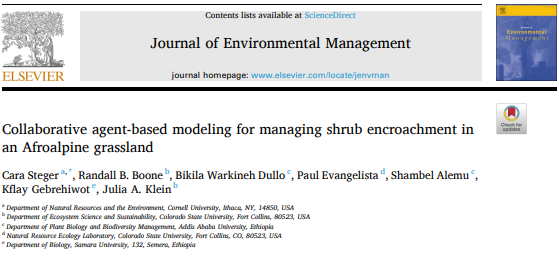Are you interested in community-based conservation and seeking traditional ecological knowledge approaches to socio-ecological models? Interested in participatory/co-design methods in Afroalpine spaces? Are you invested in the co-creation of knowledge and participatory modeling?
Mountain Sentinel collaborators authored a paper that sparks interesting discourse on the subjects above! If you are interested, check out the abstract below and the provided link to the paper.
ABSTRACT
We co-designed an agent-based model of an Afroalpine grassland in Ethiopia that is experiencing unwanted shrub encroachment. The goal was to enable managers of a community conservation area to better understand the drivers of shrub encroachment and to test possible management actions for controlling shrubs. Due to limited site-specific data, we parameterized this model using insights from published literature, remote sensing, and expert opinion from scientists and local managers. We therefore sought to explore potential future scenarios rather than make highly accurate predictions, focusing on facilitating discussions and learning among the diverse co-management team. We evaluated three social-ecological scenarios with our model, examining: (1) the impact of changing precipitation regimes on vegetation, (2) whether changing the frequency of guassa grass harvests would improve the long-term sustainability of the grassland, and (3) whether the combination of grass harvest and shrub removal would affect shrub encroachment. We found that the model was highly sensitive to the amount of grass harvested each year for local use. Our results indicate that the guassa grass was more resilient than shrubs during persistent dry climatic conditions, whereas a reduction in only the early spring rains (known as the “belg”) resulted in considerable loss of grass biomass. While our modeling results lacked the quantitative specificity desired by managers, participants in the collaborative modeling process learned new approaches to planning and management of the conservation area and expanded their knowledge of the ecological complexity of the system. Several participants used the model as a boundary object, interpreting it in ways that reinforced their cultural values and goals for the conservation area. Our work highlights the lack of detailed scientific knowledge of Afroalpine ecosystems, and urges managers to reconnect with traditional ecological management of the conservation area in their pursuit of shrub encroachment solutions. The decline or absence of the belg rains is becoming increasingly common in the Ethiopian highlands, and our results underscore the need for more widespread understanding of how this changing climatic regime impacts local environmental management. This work lays a foundation for social-ecological research to improve both understanding and management of these highly threatened ecosystems.
Keywords:
Community-based conservation
Ethiopia
Participatory modeling
Social-ecological systems
Traditional ecological knowledge
Co-design and co-creation

